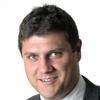How to grow a global specialist
22 July 2024
Time Manufacturing Company has grown significantly through acquisition in recent years, with its number of employees in Europe quadrupling, to become a major producer of specialist customised lifts operating under numerous brand names.
With new CEO Roman Rariy on the scene, how does he see the future for a global, multifaceted juggernaut operating in an ultra-customer focused sector?
Access Briefing met up with Rariy, who took over the reins of the global business six months ago, along with the group’s European team, at its France Elévateur facilities in Flavigny-sur-Moselle, which are celebrating 40 years in operation and the launch of new assembly lines for Ruthmann and Versalift.
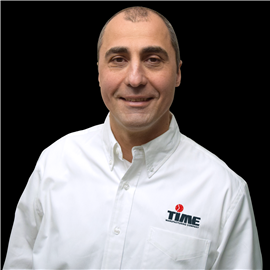 Time Manufacturing Company’s new CEO Roman Rariy.
Time Manufacturing Company’s new CEO Roman Rariy.
As Rariy points out the new production lines reflect the US-based group’s wider plans to optimise the business across its multiple European brands, following a series of acquisitions since 2021. They have included truck mount specialist Ruthmann and its two divisions Bluelift spiders and US distributor ReachMaster, as well as utility vehicle mount specialists France Elévateur and Spain-based Movex, which sit alongside Time’s longstanding Versalift brand.
Rariy’s experience covers leading positions at eHealth, Lionbridge and the Kraft Heinz Company. Notably none in the lift or engineering sectors.
He comments, “If you look at my resume, you will probably be asking yourself, ‘What is this guy doing leading this company?”
Rather, Rariy’s skills lie in product development, sales and company transformation – the latter being a key area of focus with the group’s investment in Ruthmann, France Elévateur and Movex.
“You can say that I bring a softer skill set to the table,” explains Rariy, “I can understand quickly what really matters in a particular environment, what really needs to be addressed and then have the perseverance to push it through and get it done.” In summary, “I specialise in transforming companies.”
“And I’m pretty sure that every company right now, regardless of performance needs transformation, because the world is quickly transforming. Open any newspaper and you will see companies that don’t transform become obsolete.”
Assembly firsts
Returning to the subject of the new assembly lines, they also enable Ruthmann to offer shorter lead times, due to a lack of capacity at their facilities in Germany. For Versalift, the introduction of the assembly lines means it can optimise its processes to better serve French customers. It also provides a response to the production space that has become available at France Elévateur. This follows the end of the telecoms boom in France
As such, the Flavigny-sur-Moselle plant has become the first site to host production from all three of the European brands in the Time group.
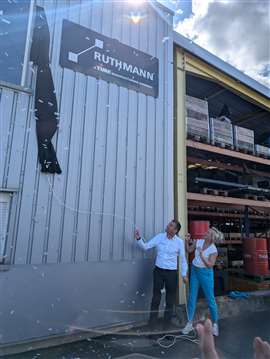 The official opening of the Ruthmann assembly plant at France Elévateur.
The official opening of the Ruthmann assembly plant at France Elévateur.
The new Ruthmann lines in France will assemble kits for the 23, 30 and 33m working height T230 XS, T300 XS and T330 XS truck mounts that will be transported to Ruthmann’s German headquarters and mounted on 7.5 tonne trucks.
In contrast, the new Versalift assembly line was first was set up to fulfil an order from a major French customer and will focus on pre-assembled VDTL-135, VDTL-150-F and VDTL-160-F models that are mounted on vans or chassis at the France Elévateur site.
In Time’s case, one of the first steps in this process, apart from the reorganisation of production in France, which started before Rariy arrived at Time, has been the merger of the Versalift’s European divisions.
Combining Europe
Effective from July, Versalift United Kingdom, Versalift Ireland and Versalift Denmark have become a single entity - Versalift Europe.
Stepping into the role of Managing Director of the newly formed Versalift Europe is Martin Lybæk Christiansen, formerly the Managing Director of Versalift Denmark
The merger is designed to unify operations, streamline processes, and strengthen Versalift’s position in the European market.
On that note, Rariy makes clear there are no plans to step out from the specialist, highly customised equipment that it offers.
Nor is there an immediate plan to merge the well-known brand names that make up the European side of the group.
“We have three business units and they need to function as one but we don’t need to merge them,” Rariy states.
The group was founded in North America and stated from “very humble beginnings” in Waco, Texas, where it is still headquartered. There, the brands are the longstanding and core Versalift name, Aspen Aerial and BrandFX.
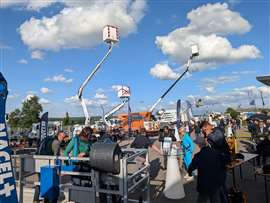 The 40th anniversary celebrations at France Elévateur’s headquarters.
The 40th anniversary celebrations at France Elévateur’s headquarters.
Again there are definitely no plans to merge any of them. “Transformation is a little bit different in North America from Europe,” says Rariy, “Maintaining individuality and the uniqueness of each business unit in USA is much easier - it’s the same country, the same language.”
There’s no need to merge the brands you’ve just got to merge the business.” Rariy adds, “The European situation is different. There is the difference in cultures but also products and they need to operate as independent business units yet work together as a united group.
For example, “We are already taking steps to centralise purchasing procurement to create efficiencies across the network. Not only within Europe but on a global level. This is likely to extend to the engineering groups too.”
While specialist access equipment like spider lifts and compact truck and van mounts have become an everyday fixture in Europe, the US market has been less inclined to embrace less mainstream powered access solutions. That is until now.
North American insights
One of Time’s investments, that came with the Ruthmann acquisition, was US-based distributor of European specialist access equipment ReachMaster. Ruthmann had originally bought the company to help promote its products in the USA, including its truck mounts and Bluelift spiders.
Rariy sees an opportunity in the rising interest in these product types in North America. “We’re actively investigate that and looking at what additional products we should be offering in the North American market that are made in Europe.” However, the idea of manufacturing European products in North America is less likely.
“It is possible but not probable as the volume need to be really high. For example, spiders are relatively easy to ship in containers.
“At the moment we are just identifying what products work in addition to the ones we already have there.” Another unique factor for Time, is that it essentially sits outside construction, giving it an immediate advantage over the cyclical nature of the construction industry.
As Rariy confirms, “I don’t look at construction as a market which we’re going to move into. It’s a very seasonal, and it’s really off our core market. “If we sell products there organically, I’ll accept it. But I’m not going to start a campaign of moving marketing into construction.”
Indeed, many manufacturers and rental companies are creating specialist equipment division in response to the insecurity of the construction industry. “Up and down, it’s very difficult to manage inventory,” says Rariy. “You tie in your working capital and all your cash and demand drops.
“We currently operate in strong market segments. Like everything else in life, it can go up and down but on balance it remains extremely positive now and in the long-term view.”
With a relatively low volume product, the commitment to quality is even more important. “We tend to continue positioning ourselves as a superior product, very close to the customer and continue to fight in those markets.”
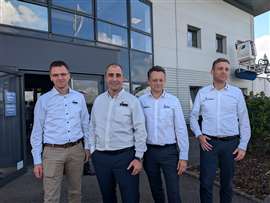 From left: Martin Christiansen, managing director Versalift Europe; Roman Rariy, CEO, Time Manufacturing Company; Charles Goffin, managing director, France Elévateur and Uwe Strotmann, managing director, Ruthmann, at the 40th anniversary celebrations.
From left: Martin Christiansen, managing director Versalift Europe; Roman Rariy, CEO, Time Manufacturing Company; Charles Goffin, managing director, France Elévateur and Uwe Strotmann, managing director, Ruthmann, at the 40th anniversary celebrations.
While Rariy describes Time as an acquisitions company there are no direct plans to expand the portfolio with any further companies. “If an apparent opportunity comes along, it’s not off the table. I don’t have anything in mind right now, but would we? Yes, we would.”
A matter of key importance for Rariy is to provide assurances to the company’s employees, particularly in Europe, where there has been substantial change in recent times. In the couple of years leading to 2022 the number of European employees in the group rose more than four-fold following its raft of acquisitions.
That combined with the recent decision to shift some production out of Ruthmann’s headquarters, the company’s management team are keen to let employees know that are on a steady ship. Rariy says, “If somebody stopped me on the shop floor and asked me what’s going on, I could sum it up in a very short one-liner: the future is bright and the future is better together.”
“We want to keep our people with us. It’s very important. We want to keep our customers of course, but we want to keep our people. We want to give them a great place to work.”
Acquisition strength
This clear message that from company management’s view, it has become stronger as a result of the acquisitions and the decision to assemble other brands at the France Elévateur site. Ruthmann had a demand for units but some of the lead times were up to two years.
“They didn’t have the capacity, so there was nothing they could do. They could try and build capacity which could take months if not years, starting with the facilities and then personnel training.
“It’s a complex thing and required planning but they worked through it, and now they ship raw material from Germany to France. Qualified engineers put it together on the subframe and ship the full units back, where it is mounted on the chassis. They do the final touches and the final checks and off we go.” Rariy adds, “What’s happening at France Elévateur, is the first step.”
“We live by our success and this was a real success. The team identified a production hole here in France and worked together to fill that hole. It also means the French team and German team are now used to working together.”
Growth prospects When you look at the specialised, customised products covered by Time Manufacturing, growth through taking market share is the way forward in its traditional markets, due to them being saturated to a greater or lesser extent. The solution is in a whole new level of customer relationship and service, through the company’s Customer 360 Initiative.
“We’re customer-centric before sales, during sales, after sales, through both parts and service and training…and refurbishment. If customers don’t want to buy a new unit, we can refurbish it. “So, that’s what we mean by Customer 360 and that what we believe is the way to grow. Firming up the existing relationship and the service.”
The company concedes that competition is high in their sector, with opportunities for new growth in Europe coming from east-based countries, notably Poland, the Czech Republic and Slovakia, which are still young markets for Versalift’s type of equipment particularly, with acute competition in Southern Europe on price.
“We will probably never be the cheapest in terms of the individual unit, but where we stand up against the others is through total cost of ownership. The market share we can gain is through that.”
The advantage of also having a brand like Movex, based in Spain and originally acquired by France Elévateur, before it was bought by Time, there is direct access to emerging markets. For example, in North Africa and the Middle East, where the Movex has a customer base through its products that are not at the same premium level as the Versalift offering.
“The focus of our organisation is to have very crisp brands - each with its own story. They need to have a very clear line of separation with unique messages for their markets.” “If we elevate to the European level, then that’s where you start seeing some overlapping and blurring. So, to be fair, we have work to do. To be able to define the brands in a very crisp way.” Rariy’s plan is to set up a brand management group, that will see induvial brand manager from each division working together.
“Defining brand positioning is a very difficult thing to do and we [Time Manufacturing] need to develop as strong a brand management as Procter & Gamble or Unilever. “Innovation doesn’t mean making things more complex, it just makes them Innovative. We have combined three business units here, and probably have more engineers and know-how than any other group in Europe. So, we have talented people and the intention is to continue to innovate. So we can always be one or two steps ahead”
China manufacturing threat?
With provisional tariffs having been announced by the European Commission on MEWPs produced in China entering the EU, how does Rariy see the potential threat of new manufacturers producing the same kind of specialist products as Time?
“It would be hard to do customisation at the level we do customisation in China - borderline impossible,” Rariy believes. “And there is also always going to be a certain price point for this type of equipment.” So, the only way would be for a company from China to establish a presence in Europe and essentially become a local player. If they do that, then they instantaneously lose the advantage gained from producing in China. There is another disadvantage to having your main base at a distance from your customer, says Rariy, returning to a previous point.
“This is a customer-centric business. If you’re that far away, that customer intimacy is going to be missing, so then they you will have to establish operations in Europe, which means again you are just one of the local players.”
However, Rariy believes it is only a matter of time before new manufacturers turn their attention to the sector. “I do believe that it will start happening, maybe with some more standard units. It’s hard to predict the future but it will be a problem. I don’t think we’re immune to it, but I don’t think it’s going to happen tomorrow.”

